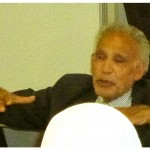Karam Khella: The re-establishment of Maat

Karam Khella - Der Vortragende des Abends
Maat as a principle of justice, this was the motto Prof. Dr. Karam Khella intended to present his lecture announced as “revelution of the arabic people for freedom” on last thursday (26.05.2011) under. The principle “Maat” might have not been the only unexplained concept of the evening.
Prof. Dr. Karam Khella born in Asjut (Egypt) in 1934 taught as a professor (emeritus) in Germany as well as in many european and non-european universities. Khella acted for a multitude of academics including history, philosophy and philosophy of science. Mr. Khella is thereby not an inexperienced lecturer on that subject in question. However, that night during his 50 minute lecture he did not manage to neither draw a clear picture on what is going on right now in the Arabic World nor, as promised in the lecture’s invitation flyer, to describe motives, correlations, backgrounds, characteristics, perspectives in a comprehensible way.
The discussion following the lecture turned out to be significantly more successful. A fact which was not due to the lecturer but the interested and good informed audience. The hosts, the Brunswieck peace centre, described this factor actually with the laconic and for Khella little coaxing sentence: “The audience is more practicle in its explanations as the lecturer”.
For the time being here is an explanation for all who are not familiar with the term and principle of “Maat”. According to the text it is about the balance of power. Maybe naturally, because he was born there, Khella concentrated his analysis on the occurences in Egypt. Introductorily, Khella described the Arabic Spring as a “unique incidence because it was initiated by the people without any intervention from parties etc.” “From a world-historic point of view, Khella continued, there is no parallel”.
Perspectively Khella warned that “people are not given the freedom (by the West) to develop and find their own way to democracy”. As a forecast Khella dared to say that “people’s thinking will change, as they recognized that they can make a difference”. People are making history, most importantly, the revolution takes place in their head, Khella reminded again and again.
And, that’s how he concluded his lecture, the revolution will continue to spread and not only in the Arabic World. He described the current conflicts in Greece and Spain as a extension of the arabic revolution and as an attempt of the people to get rid of the “ancient regime”.
Das Informationsbedürfnis des Publikums nach den Vorgängen in Libyen und Syrien ließ er weitesgehend unbefriedigt. Als fast fatal muss man seine – vielleicht nicht in der Konsequenz zu Ende gedachte Bemerkung – hinsichtlich Syriens bewerten, bei der er von einer nicht vorhandenen Alternative zu Bashir al-Assad sprach, Syriens amtierenden Präsidenten. Eine Aussage, die im Publikum zurecht und völlig nachvollziehbar Empörung auslöste. In einem leidenschaftlichen Plädoyer fasste einer der Teilnehmer sein Unverständnis mit den Worten zusammen: “Bei über 20 Mio. Einwohnern in Syrien wird sich doch mindestens eine Person finden lassen, die in der Lage ist, das Land zu regieren.” Dem ist nicht hinzuzufügen.
